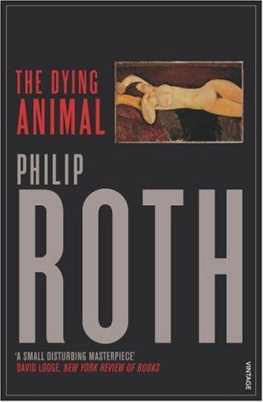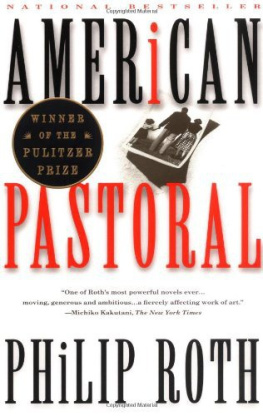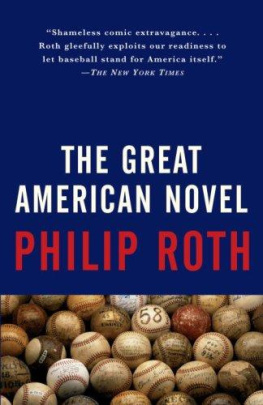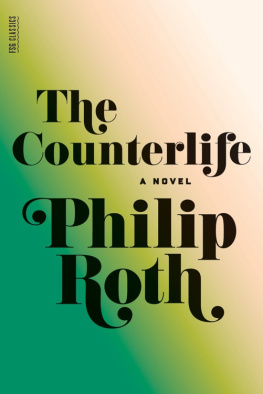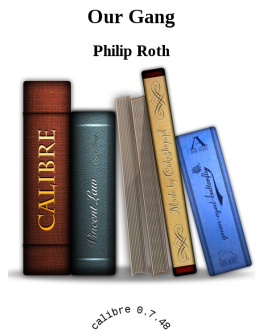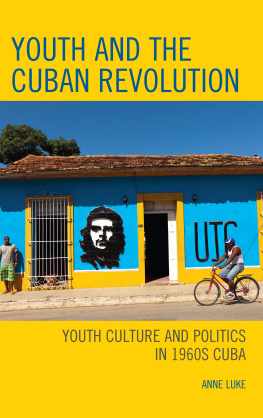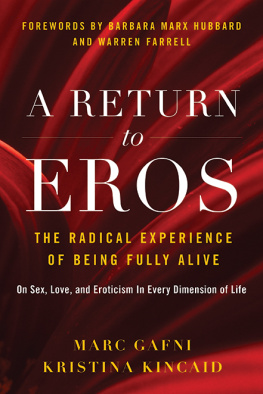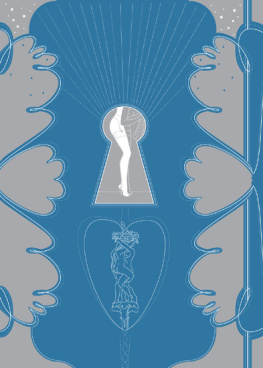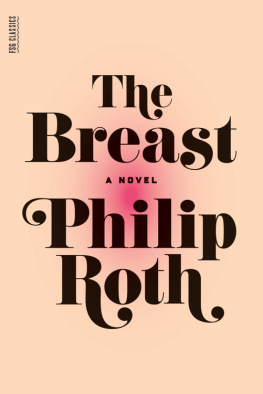
The Dying Animal
BOOKS BY PHILIP ROTH ZUCKERMAN BOOKS
The Ghost Writer Zuckerman Unbound The Anatomy Lesson
The Prague Orgy
The Counterlife
American Pastoral
I Married a Communist
The Human Stain
ROTH BOOKS
The Facts
Deception
Patrimony
Operation Shylock
KEPESH BOOKS
The Breast
The Professor of Desire The Dying Animal
OTHER BOOKS
Goodbye, Columbus Letting Go When She Was Good Portnoy's Complaint Our Gang The Great American Novel
My Life as a Man Reading Myself and Others
Sabbath's Theater
The Dying Animal
Philip Roth
Copyright 2001 by Philip Roth All rights reserved
For information about permission to reproduce selections
from this book, write to Permissions, Houghton Mifflin Company, 215 Park Avenue South, New York, New York 10003.
Visit our Web site: www.houghtonmiminbooks.com.
Library of Congress Catakging-in-Publicatim Data
Roth, Philip.
The dying animal / Philip Roth.
I. Tide
p. cm.
isbn 0-618-13587-1
ps3568.o855 095 2001
813'.54dc2i 00-054225
Printed in the United States of America
Book design by Robert Overholtzer
qum 10 98765432 i
For N. M.
The body contains the life story just as much
as the brain.
edna o'brien
The Dying Animal
I knew her eight years ago. She was in my class. I don't teach full-time anymore, strictly speaking don't teach literature at allfor years now just the one class, a big senior seminar in critical writing called Practical Criticism. I attract a lot of female students. For two reasons. Because it's a subject with an alluring combination of intellectual glamour and journalistic glamour and because they've heard me on NPR reviewing books or seen me on Thirteen talking about culture. Over the past fifteen years, being cultural critic on the television program has made me fairly well known locally, and they're attracted to my class because of that. In the beginning, I didn't realize that talking on TV once a week for ten minutes could be so impressive as it turns out to be to these students. But they are helplessly drawn to celebrity, however inconsiderable mine may be.
Now, I'm very vulnerable to female beauty, as you know. Everybody's defenseless against something, and that's it for me. I see it and it blinds me to everything else. They come to my first class, and I know almost immediately which is the girl for me. There is a Mark Twain story in which he runs from a bull, and the bull looks up to him when he's hiding in a tree, and the bull thinks, "You are my meat, sir." Well, that "sir" is transformed into "young lady" when I see them in class. It is now eight years agoI was already sixty-two, and the girl, who is called Con-suela Castillo, was twenty-four. She is not like the rest of the class. She doesn't look like a student, at least not like an ordinary student. She's not a demi-adolescent, she's not a slouching, unkempt, "like"-ridden girl.
She's well spoken, sober, her posture is perfectshe appears to know something about adult life along with how to sit, stand, and walk. As soon as you enter the class, you see that this girl either knows more or wants to. The way she dresses. It isn't exactly what's called chic, she's certainly not flamboyant, but, to begin with, she's never in jeans, pressed or unpressed. She dresses carefully, with quiet taste, in skirts, dresses, and tailored pants.
Not to desen-sualize herself but more, it would seem, to professionalize herself, she dresses like an attractive secretary in a prestigious legal firm. Like the secretary to the bank chairman. She has a cream-colored silk blouse under a tailored blue blazer with gold buttons, a brown pocketbook with the patina of expensive leather, and little ankle boots to match, and she wears a slightly stretchy gray knitted skirt that reveals her body lines as subtly as such a skirt possibly could. Her hair is done in a natural but cared-for manner. She has a pale complexion, the mouth is bowlike though the lips are full, and she has a rounded forehead, a polished forehead of a smooth Brancusi elegance. She is Cuban. Her family are prosperous Cubans living in Jersey, across the river in Bergen County. She has black, black hair, glossy but ever so slightly coarse. And she's big. She's a big woman. The silk blouse is unbuttoned to the third button, and so you see she has powerful, beautiful breasts. You see the cleavage immediately. And you see she knows it. You see, despite the decorum, the meticulousness, the cautiously soigne styleor because of themthat she's aware of herself. She comes to the first class with the jacket buttoned over her blouse, yet some five minutes into the session, she has taken it off. When I glance her way again, I see that she's put it back on. So you understand that she's aware of her power but that she isn't sure yet
how to use it, what to do with it, how much she even wants it. That body is still new to her, she's still trying it out, thinking it through, a bit like a kid walking the streets with a loaded gun and deciding whether he's packing it to protect himself or to begin a life of crime.
And she's aware of something else, and this I couldn't know from the one class meeting: she finds culture important in a reverential, old-fashioned way. Not that it's something she wishes to live by. She doesn't and she couldn'ttoo traditionally well brought up for thatbut it's important and wonderful as nothing else she knows is. She's the one who finds the Impressionists ravishing but must look long and hardand always with a sense of nagging con-foundmentat a Cubist Picasso, trying with all her might to get the idea. She stands there waiting for the surprising new sensation, the new thought, the new emotion, and when it won't come, ever, she chides herself for being inadequate and lacking... what? She chides herself for not even knowing what it is she lacks. Art that smacks of modernity leaves her not merely puzzled but disappointed in herself. She would love for Picasso to matter more, perhaps to transform her, but there's a scrim drawn across the proscenium of genius that obscures her vision and keeps her worshiping at a bit of a distance. She gives to art, to all of art, far more than she gets back, a sort of earnestness that isn't without its poignant appeal. A good heart, a lovely face, a gaze at once inviting and removed, gorgeous breasts, and so newly hatched as a woman that to find fragments of broken shell adhering to that ovoid forehead wouldn't have been a surprise. I saw right away that this was going to be my girl.
Now, I have one set rule of some fifteen years' standing that I never break. I don't any longer get in touch with them on a private basis until they've completed their final exam and received their grade and I am no longer officially in loco parentis. In spite of temptationor even a clear-cut signal to begin the flirtation and make the approachI haven't broken this rule since, back in the mid-eighties, the phone number of the sexual harassment hotline was first posted outside my office door. I don't get in touch with them any earlier so as not to run afoul of those in the university who, if they could, would seriously impede my enjoyment of life.
I teach each year for fourteen weeks, and during that time I don't have affairs with them. I play a trick instead. It's an honest trick, it's an open and above-board trick, but it is a trick nonetheless. After the
final examination and once the grades are in, I throw a party in my apartment for the students. It is always a success and it is always the same. I invite them for a drink at about six o'clock. I say that from six to eight we are going to have a drink, and they always stay till two in the morning. The bravest ones, after ten o'clock, develop into lively characters and tell me what they really are interested in. In the Practical Criticism seminar there are about twenty students, sometimes as many as twenty-five, so there will be fifteen, sixteen girls and five or six boys, of whom two or three are straight. Half of this group has left the party by ten. Generally, one straight boy, maybe one gay boy, and some nine girls will stay. They're invariably the most cultivated, intelligent, and spirited of the lot. They talk about what they're reading, what they're listening to, what art shows they've seenenthusiasms that they don't normally go on about with their elders or necessarily with their friends. They find one another in my class. And they find me. During the party they suddenly see I am a human being. I'm not their teacher, I'm not my reputation, I'm not their parent. I have a pleasant, orderly duplex apartment, they see my large library, aisles of double-faced bookshelves that house a lifetime's reading and take up almost the entire downstairs floor, they see my piano, they see my devotion to what I do, and they stay.
Next page
